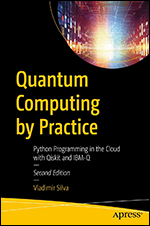Quantum Computing for Computer Scientists
- 6h 12m
- Mirco A. Mannucci, Noson S. Yanofsky
- Cambridge University Press
- 2008
The multidisciplinary field of quantum computing strives to exploit some of the uncanny aspects of quantum mechanics to expand our computational horizons. Quantum Computing for Computer Scientists takes readers on a tour of this fascinating area of cutting-edge research. Written in an accessible yet rigorous fashion, this book employs ideas and techniques familiar to every student of computer science. The reader is not expected to have any advanced mathematics or physics background. After presenting the necessary prerequisites, the material is organized to look at different aspects of quantum computing from the specific standpoint of computer science. There are chapters on computer architecture, algorithms, programming languages, theoretical computer science, cryptography, information theory, and hardware. The text has step-by-step examples, more than two hundred exercises with solutions, and programming drills that bring the ideas of quantum computing alive for today’s computer science students and researchers.
- Explains quantum mechanics in a way that makes sense to computer scientists
- Includes more than 200 hands-on exercises to build confidence and understanding
- Features quantum computing experiments using MATLAB, to bring the ideas alive on your computer
About the Authors
Noson S. Yanofsky, PhD, is an Associate Professor in the Department of Computer and Information Science at Brooklyn College, City University of New York and at the PhD Program in Computer Science at The Graduate Center of CUNY.
Mirco A. Mannucci, PhD, is the founder and CEO of HoloMathics, LLC, a research and development company with a focus on innovative mathematical modeling. He also serves as Adjunct Professor of Computer Science at George Mason University and the University of Maryland.
In this Book
-
Complex Numbers
-
Complex Vector Spaces
-
The Leap from Classical to Quantum
-
Basic Quantum Theory
-
Architecture
-
Algorithms
-
Programming Languages
-
Theoretical Computer Science
-
Cryptography
-
Information Theory
-
Hardware
-
Bibliography




